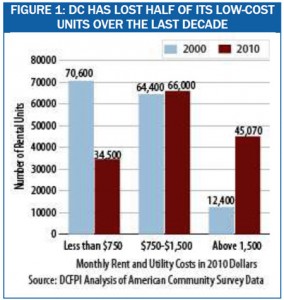Mayor Gray drew a standing ovation last night during his State of the District address when he pledged to invest $100 million to create 10,000 units of affordable housing. It isn’t a surprise that this drew such a positive reaction given the rapid loss of affordable housing in DC, the fact that residents rated it the number one issue at a city-wide summit, and that funding for affordable housing has fallen significantly in recent years.
DCFPI applauds Mayor Gray for pledging a big investment in affordable housing. At the same time, getting to 10,000 units may require additional support. In particular, the mayor indicated that the funding would be provided on a one-time basis, rather than serving as an ongoing commitment every year. That works out to be about $10,000 per unit ‘ an amount that is unlikely to be enough to support affordable development, as mentioned by Coalition for Nonprofit Housing and Economic Development’s Bob Pohlman in a Housing Complex post. Housing built under the Housing Production Trust Fund, for example, typically requires subsidies of $75,000 or more per unit.
support. In particular, the mayor indicated that the funding would be provided on a one-time basis, rather than serving as an ongoing commitment every year. That works out to be about $10,000 per unit ‘ an amount that is unlikely to be enough to support affordable development, as mentioned by Coalition for Nonprofit Housing and Economic Development’s Bob Pohlman in a Housing Complex post. Housing built under the Housing Production Trust Fund, for example, typically requires subsidies of $75,000 or more per unit.
A one-time commitment also would make it unlikely that this new housing investment could serve DC’s most vulnerable residents ‘ a population Mayor Gray pointed out in his speech. This is because programs geared at helping these residents ‘ such as the Local Rent Supplement Program or Permanent Supportive Housing Program ‘ require funding each year to help residents pay the difference between their very low-incomes and the high costs of rent.
The $100 million investment will come on top of the affordable housing funding already committed to various programs. After seeing funding for affordable housing fall 27 percent from its peak in fiscal year 2008, Mayor Gray’s pledged investment in fiscal year 2014 would represent the largest one-year investment in affordable housing in the city’s history. We look forward to the details of Mayor’s Gray’s planned investment and strategies for creating 10,000 units of affordable housing ‘ housing we urge to be made available to both low- and moderate-income residents.
To print a copy of today’s blog, click here.
